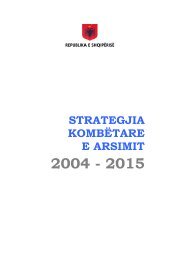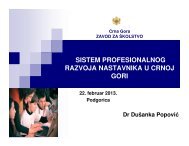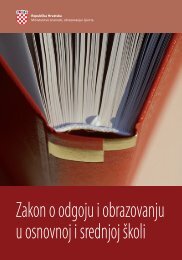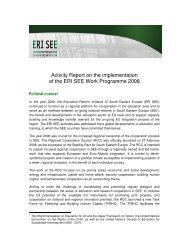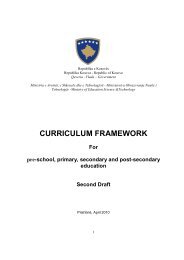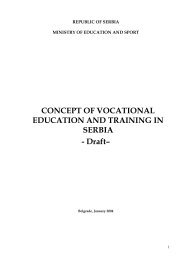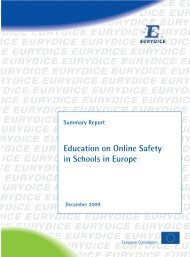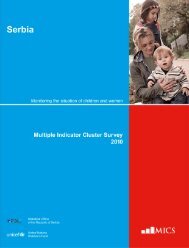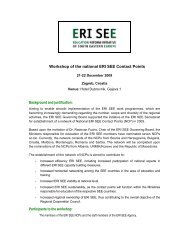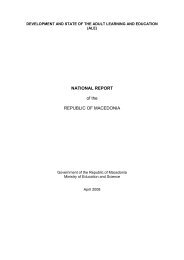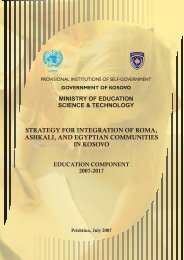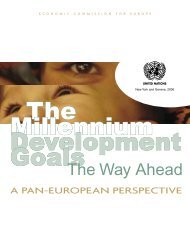2.3. Establishment of private educational institutionsThe legislation applied in <strong>Kosovo</strong> recognizes <strong>the</strong> right of <strong>communities</strong> to set up privateeducational <strong>and</strong> training establishments, to seek public funding, <strong>and</strong> to request accreditationby <strong>the</strong> Ministry of Education. 42 Currently, <strong>the</strong> only private educational institutions impartingeducation in <strong>the</strong> languages <strong>and</strong> <strong>the</strong> cultures of <strong>non</strong>-<strong>majority</strong> <strong>communities</strong> are located inPrishtinë/Priština <strong>and</strong> Štrpce/Shtërpcë. Intervention by <strong>the</strong> Ministry of Education is limited tosetting recognition <strong>and</strong> licensing rules, 43 without financial or o<strong>the</strong>r support. Currentinitiatives are confined to projects of international or local <strong>non</strong>-governmental organizations(NGOs) <strong>and</strong> providing extra-curricular educational activities, mainly for <strong>primary</strong> schoolchildren. The <strong>Kosovo</strong> Turk community enjoys a comparative advantage due to <strong>the</strong> support of<strong>the</strong> government of Turkey.In Prishtinë/Priština, <strong>the</strong> Gulistan Education Centre 44 provides <strong>primary</strong> <strong>and</strong> secondaryeducation in English, Turkish <strong>and</strong> Albanian. In Štrpce/Shtërpcë, a private university fromNovi Sad, <strong>the</strong> Faculty for Business Services (Fakultet za Uslužni Biznis), provides forlectures in <strong>the</strong> Serbian language. 45 In nor<strong>the</strong>rn Mitrovica/Mitrovicë a Culture <strong>and</strong> Art Societyof <strong>the</strong> <strong>Kosovo</strong> Bosniak community has ceased to operate due to lack of funds. It helpedstudents of this community to preserve <strong>the</strong>ir culture <strong>and</strong> historical diversity in ways notafforded by ei<strong>the</strong>r educational system.In Gjilan/Gnjilane region, Ashkali students have occasional access to catch-up classesorganized by NGOs to support <strong>the</strong>ir integration in elementary <strong>and</strong> secondary schools. InMitrovicë/Mitrovica <strong>and</strong> Vushtrri/Vučitrn, civil society initiatives offer extra-curricularactivities on Turkish language, history, culture, music <strong>and</strong> dance for <strong>Kosovo</strong> Turk pupils. Innor<strong>the</strong>rn Mitrovica/Mitrovicë <strong>and</strong> Leposavić/Leposaviq <strong>the</strong> NGOs Caritas <strong>Kosovo</strong> <strong>and</strong>Padem have implemented pre-<strong>primary</strong> classes <strong>and</strong> <strong>primary</strong> supplementary Romani <strong>and</strong>Serbian language education for Roma children. In Fushë-Kosovë/<strong>Kosovo</strong> Polje, <strong>the</strong> NGOBalkan Sunflowers <strong>and</strong> <strong>the</strong> Centre for Co-operation <strong>and</strong> Integration run a “learning centre”project for some 350 Ashkali <strong>and</strong> Egyptian pupils. 46 In Podujevë/Podujevo, CareInternational promotes school integration of Ashkali, Roma <strong>and</strong> Albanian pupils throughjoint projects. 47 In Gračanica/Graçanicë, Balkan Sunflowers operates a Roma educationcentre for pre-school children in Shtime/Štimlje. This NGO implements an “after schoolhomework” project targeting approximately 100 pre-school to fifth grade Ashkali pupils.Since 2002, <strong>the</strong> NGO Bethany Christian Services has provided supplementary education to170 Roma, Ashkali <strong>and</strong> Egyptian pre-school <strong>and</strong> <strong>primary</strong> education pupils in <strong>the</strong> Koloniainformal settlement (Gjakovë/Đakovica).2.4. Alternative solutions42 Art. 22, Law on <strong>the</strong> Use of Languages; Art. 8.4, 2008 Law on <strong>the</strong> Rights of Communities.43 Ministry of Education, Science <strong>and</strong> Technology, Administrative Instructions No. 3/2003 on Licensing <strong>and</strong>Registration of Private Primary <strong>and</strong> Secondary Education Institutions in <strong>Kosovo</strong>; <strong>and</strong> No. 14/2003 onLicensing of Private Higher Education Institutions in <strong>Kosovo</strong>.44 Private educational institution jointly managed by <strong>the</strong> International School of Prishtinë/Priština <strong>and</strong> <strong>the</strong>Mehmet Akif College: mixed classes, integrating <strong>the</strong> <strong>Kosovo</strong> <strong>and</strong> Republic of Turkey curricula.45 The centre is licensed by <strong>the</strong> Serbian Ministry of Education.46 The project started in March 2008. It supports Ashkali <strong>and</strong> Egyptian pupils in doing <strong>the</strong>ir homework.47 “After school homework” (pupils of grade 1-5) <strong>and</strong> “Stop illiteracy”, (women’s education).11
If education in <strong>the</strong> chosen official language or in <strong>the</strong> native community language is notavailable, <strong>the</strong> legislation applied in <strong>Kosovo</strong> requires that municipalities or <strong>the</strong> governmentoffer alternatives, including subsidized transport to an area where such education is available,distance learning, roving teaching arrangements or offers of boarding. 48 In practice, wheremo<strong>the</strong>r tongue education is not available, alternative solutions are mainly limited to transportarrangements. However, <strong>Kosovo</strong> Serb <strong>majority</strong> municipalities in nor<strong>the</strong>rn <strong>Kosovo</strong> do notsupport transportation of <strong>Kosovo</strong> Albanian pupils. In 2009, <strong>the</strong> construction of more schoolsin <strong>the</strong> <strong>Kosovo</strong>-curriculum system has insufficiently prioritised <strong>non</strong>-<strong>majority</strong> <strong>communities</strong>. In<strong>the</strong> absence of tangible central measures <strong>and</strong> guidance, active initiatives to ensure <strong>the</strong>educational integration of <strong>the</strong> vulnerable Roma, Ashkali <strong>and</strong> Egyptian students are in placeonly in some municipalities. The impact of educational scholarships being introduced forpupils of <strong>the</strong>se <strong>communities</strong> needs to be fur<strong>the</strong>r assessed, particularly as it refers tocompletion of <strong>primary</strong> <strong>and</strong> secondary education <strong>and</strong> access to tertiary education.Transport arrangementsThe <strong>Kosovo</strong> Serb <strong>majority</strong> municipalities of Zvečan/Zveçan, Zubin Potok, <strong>and</strong>Leposavić/Leposaviq municipalities do not provide transport for <strong>Kosovo</strong> Albanian childrentravelling to sou<strong>the</strong>rn Mitrovicë/Mitrovica, where <strong>the</strong>y follow secondary education inAlbanian. Transport is provided ei<strong>the</strong>r by private bus (funded by private or external donors)or through <strong>the</strong> <strong>Kosovo</strong> Ministry of Transport <strong>and</strong> Communications’ humanitarian bus lines.In Leposavić/Leposaviq, <strong>the</strong>re is a private bus temporarily supported by a private donation<strong>and</strong> parents pay transport fees. <strong>Kosovo</strong> Albanian children living in nor<strong>the</strong>rnMitrovica/Mitrovicë are privately transported or walk to sou<strong>the</strong>rn Mitrovicë/Mitrovica. Atpresent, walking is not considered safe for <strong>the</strong> <strong>Kosovo</strong> Albanian students of <strong>the</strong>Mikronaselje/Kodra e Minatorëve enclave (nor<strong>the</strong>rn Mitrovica/Mitrovicë), who have to passthrough <strong>Kosovo</strong> Serb areas. Thus, children whose families cannot afford private transportreceive education in a temporary, inadequate school container lacking <strong>the</strong> necessary logisticalconditions. The municipal director of education refuses to provide transport 49 for <strong>the</strong>sechildren until adequate school premises are available, because, in his opinion, this initiativewould be contrary to <strong>the</strong> goal of inter-ethnic integration in <strong>the</strong> divided town.For <strong>Kosovo</strong> Bosniak students, attending secondary education often implies travel <strong>and</strong>transport costs 50 that are not covered by municipalities. In Podujevë/Podujevo, Ashkali <strong>and</strong>Roma pupils living in remote areas have no access to school transport. Vushtrri/Vučitrn, 51Fushë Kosovë/<strong>Kosovo</strong> Polje 52 <strong>and</strong> Lipjan/Lipljan 53 municipalities provide free transport to48 Art. 19.4, Law on <strong>the</strong> Use of Languages; Art. 8.2, 2008 Law on <strong>the</strong> Rights of Communities. Roving teachersare teachers that would travel <strong>and</strong> provide mo<strong>the</strong>r tongue education to small groups of students living indifferent locations. Offers for boarding would ensure that a child for which mo<strong>the</strong>r tongue education is notavailable in <strong>the</strong> municipality of origin can attend such education in ano<strong>the</strong>r location with board <strong>and</strong> lodgingexpenses paid for by <strong>the</strong> <strong>Kosovo</strong> government or by <strong>the</strong> municipality of origin.49 Article 22 of <strong>the</strong> Law on Primary <strong>and</strong> Secondary Education obliges <strong>the</strong> municipalities to provide transport forpupils attending compulsory education <strong>within</strong> <strong>the</strong>ir territory. The municipality may provide, <strong>and</strong> charge fees,for transport for pupils attending <strong>non</strong>-compulsory secondary education.50 For instance, in Prapaqan/Prapaćane (Deçan/Dečane), a <strong>Kosovo</strong> Bosniak family relying on social welfareassistance pays Euro 50 per month for transport of two children to <strong>the</strong> closest Bosnian language secondaryschool in Pejë/Peć, as <strong>the</strong>y cannot receive education in Bosnian in Deçan/Dečane.51 <strong>Kosovo</strong> Serb children of Gojbulja/Gojbulë, Grace/Gracë <strong>and</strong> Banjskë/Banjska attending secondary educationin Prilužje/Prelluzhë or nor<strong>the</strong>rn Mitrovica/Mitrovicë. They also use <strong>the</strong> humanitarian bus lines provided by<strong>the</strong> <strong>Kosovo</strong> Ministry of Transport <strong>and</strong> Communications.52 <strong>Kosovo</strong> Serb <strong>and</strong> Roma students attending Serbian curriculum in <strong>the</strong> “Sveti Sava” school, in Bresje.53 <strong>Kosovo</strong> Croat, Roma, <strong>Kosovo</strong> Bosniak <strong>and</strong> <strong>Kosovo</strong> Serb students attending Serbian curriculum secondaryschools in Suvi Do/Suhodoll, Donja Gušterica/Gushtericë e Ulët, Laplje Selo/Llapllasellë <strong>and</strong>12



